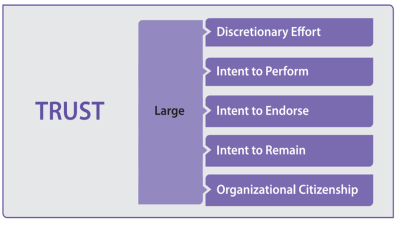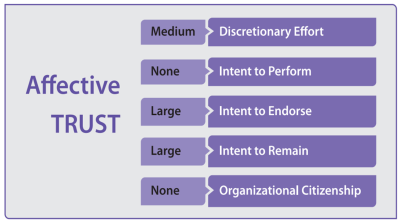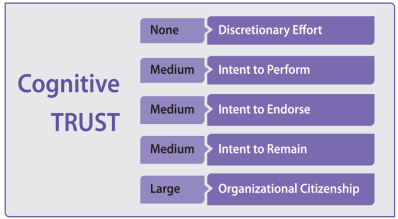New Research Identifies How Trust Impacts Employee Work Passion
 Trust at work is critical, but it can be difficult to pin down and address. Trust expert Daniel McAllister highlighted this challenge when he presented his initial research on the subject in 1995. McAllister opened with a quote from the book Behavior in Organizations.
Trust at work is critical, but it can be difficult to pin down and address. Trust expert Daniel McAllister highlighted this challenge when he presented his initial research on the subject in 1995. McAllister opened with a quote from the book Behavior in Organizations.
“Trust … tends to be somewhat like a combination of the weather and motherhood; it is widely talked about, and it is widely assumed to be good for organizations. When it comes to specifying just what it means in an organizational context, however, vagueness creeps in.”
McAllister went on to identify two types of trust—cognitive (logical) and affective (emotional). He looked at the impact each had on different measures of behavior and performance.
The Ken Blanchard Companies just released research findings on how these two elements of trust impact five measures of employee work passion. The Blanchard research offers guidance for leadership development professionals looking to create more engaging and productive work environments.
The Link between Passion and Trust
The study compared McAllister’s 11-item Affect and Cognitive Trust Scale to Blanchard’s Work Intention Inventory, which uses five intention measures to evaluate employee work passion.
McAllister’s questions measured the cognition-based element of trust—a person’s professionalism, dedication, reliability, and competence in the eyes of others; and the affect-based element—a measure of the interpersonal connection and investment in the relationship. The Blanchard questions measured five employee intentions which predict positivity and high levels of work passion.
These measures include:
- Intent to exert discretionary effort on behalf of the organization (I intend to volunteer to do things that may not be part of my job)
- Intent to perform (I intend to work efficiently to achieve all of my work goals)
- Intent to endorse the organization (I intend to talk positively about this organization to family and friends)
- Intent to remain with the organization (I intend to stay with this organization even if offered a more appealing job elsewhere)
- Intent to be a good organizational citizen (I intend to respect this organization’s assets)
 The new research found a strong correlation between McAllister’s trust components and Blanchard’s measures of employee work passion when looking at both measures as complete units.
The new research found a strong correlation between McAllister’s trust components and Blanchard’s measures of employee work passion when looking at both measures as complete units.
However, the analysis also revealed some interesting differences in the correlation of the emotional affective trust questions compared with the logical cognitive trust questions.

Affective trust in one’s leader had a large degree of positive correlation to the questions measuring Intent to Endorse and Intent to Remain, but only a medium degree of correlation to the questions measuring Discretionary Effort.
No correlation was found between the affective trust questions and Intent to Perform or the intent to be a good Organizational Citizen.
 The logical cognitive trust questions told a different story. Here, intent to be a good Organizational Citizen was correlated to a large degree, while the Intents to Perform, Endorse, and Remain were correlated to a medium degree.
The logical cognitive trust questions told a different story. Here, intent to be a good Organizational Citizen was correlated to a large degree, while the Intents to Perform, Endorse, and Remain were correlated to a medium degree.
There was no correlation between the cognitive trust questions and the intent to expend Discretionary Effort on behalf of the organization.
What measures are you looking to improve in your organization? By sharpening your knowledge about the impact trust has on work intentions, you can better design an environment where individuals trust their leaders, stay, endorse, and behave in ways that benefit the organization.
 To learn more, check out the resources below. Also, be sure to download the new Blanchard white paper Trust: An Essential Ingredient for Leadership Success. It details the new Blanchard research.
To learn more, check out the resources below. Also, be sure to download the new Blanchard white paper Trust: An Essential Ingredient for Leadership Success. It details the new Blanchard research.
References
McAllister, Daniel J. 1995. “Affect- and Cognition-Based Trust as Foundations for Interpersonal Cooperation in Organizations.” Academy of Management Journal Volume 38 , No. 1: 24-59
Nimon, K. and Zigarmi, D. 2015. “Development of The Work Intention Inventory— Short Form.” New Horizons in Adult Education and Human Resource Development. Volume 27, Issue 1, pages 15–28.
Zigarmi, D., Nimon, K., Houson, D., Witt, D., and Diehl, J. 2012. “The Work Intention Inventory: Initial Evidence of Construct Validity.” Journal of Business Administration Research. Volume 1, issue 1, pages 13–23.
Zigarmi, D., and Nimon, K. 2011. “A Cognitive Approach to Work Intention: The Stuff that Employee Work Passion is Made Of?” Advances in Developing Human Resources. Volume 13 (4), pages 447–461.
